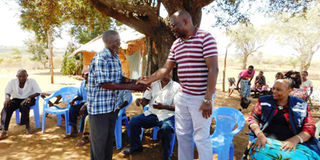Living with the curse of elephantiasis

Health ministry Head of Neglected Tropical Diseases, Dr Sultani Matedechero, shares a light moment with a beneficiary of surgeries to remove hydrocele at Lutsanga in Kilifi County. PHOTO | FILE | NATION MEDIA GROUP
For a perpetual hypochondriac, my father was very apprehensive when I joined medical school. I grew up morbidly scared of hospitals. At one time, he was admitted in hospital for six weeks and I only visited him once. I was seven years old and my childhood brain, fuelled by my mother’s reinforcement on sanitation and hygiene, was conditioned to believe that germs crawled on every hospital surface.
The visit to hospital drained me. I wouldn’t touch any surface for fear of picking up germs. It was, therefore, understandable that my father called me every Friday in my first year of medical school to ensure I was still in the programme.
Like everyone else who has not been through medical school, dad asked if I had been to the morgue and touched a cadaver. He figured if I survived that then I would survive the course. People don’t realise medical students are more scared of living patients than cadavers. With the living, one wrong move can cause irreversible damage.
The day I questioned whether I was destined to be a doctor was the most unexpected. On a random day after a laboratory session in the second year, a bunch of us were walking back to the hostels through the hospital corridors. We ran into a gentleman pushing a wheelbarrow. It took a moment to register that he was carrying his entire scrotum on the wheelbarrow. It looked like it weighed no less than 20kg.
My immediate reaction was to run. I could not fathom how a living human being could possibly bear such affliction. This was my reaction as a medical student. I could not imagine what the non-medical public thought. I felt embarrassed. This is not what was expected of the conduct of a future doctor.
CAUSE SWELLING
Every time I am reminded of neglected tropical diseases, this is the image that comes to mind. Elephantiasis is caused by a variety of roundworms (filarial worms to be precise), which include Wucherereria bancrofti which causes almost 90 per cent of cases while Brugia malayi accounts for most of the remaining 10 per cent. There exists other rarer species that wreak havoc on the lymphatic system.
The human body has a circulatory system made up of arteries, veins and capillaries through which blood flows. It has a lymphatic system through which lymph (a yellowish fluid containing white blood cells derived from body tissues) flows. The lymphatic system has lymph nodes at strategic places along its channels, which produce immune cells that fight disease. These swell when you have an infection of cancer as they work in overdrive to try and contain the problem.
In elephantiasis (scientifically referred to as lymphatic filariasis), the adult filarial worms enter the lymphatic system where they live for their entire lifespan of about six years. They reproduce and their larva forms are released into the blood stream and taken up by mosquitoes. In the mosquito, they mature and are spread to the next person through a mosquito bite and the cycle continues. The adult worm can only survive in humans.
The worm causes blockage of lymphatic channels, causing the lymph to accumulate and cause swelling of the body parts below the blockage. The swelling affects mostly the legs and the scrotum in men. However, in less common cases, it affects the arms and the breasts in women.
The swelling is accompanied by inflammation of the skin, hardening and disfiguring it. So you can imagine what this means for the delicate, almost translucent skin of the scrotum. There is so much deposition of fibrous tissue in the scrotum, causing total disfigurement and destruction of the function of the testes, and can result in extreme enlargement of over 30kg.
When the worm dies, it triggers an immune reaction that causes the patient extreme discomfort. The blocked nodes can get infected resulting in pain and ill health. The inflamed skin can break down in ulcers that are difficult to heal.
ENLARGED LEGS
The distress the disease causes is unimaginable. The patients cannot work to earn a living, are ostracised in society and are unable to carry out normal activities due to the burden of the enlarged organs. The enlarged scrotum literally swallows up the penis, making passage of urine a difficult affair. Sexual engagement is not even imaginable. The enlarged legs make walking difficult.
Elephantiasis is a disease mostly acquired in childhood. The symptoms build up with the passage of time. Many patients remain asymptomatic, but a considerable 30 per cent will live with its lifelong effects. The good news is eradication is possible by implementation of the World Health Organisation preventive treatment protocols. The bad news is that once the worm has established itself in the body, there is no drug that can destroy it and it must live out its lifespan. The preventive treatment protects one from being able to spread the disease.
Patients with scrotal elephantiasis, like the one I met, benefit from surgery. The other types of elephantiasis require lifelong care during episodes of acute inflammation or infection, but surgery has no role in their care.
The Health ministry has a dedicated department of Neglected Tropical Diseases headed by one passionate Dr Sultani Matendechero. His team launched the preventive treatment programme in 2018 and have dedicated their energies to ensuring elephantiasis is eradicated in Kenya by 2020.
Considering the high prevalence of the condition in Kenya, especially at the coastal region, these efforts must be fully supported by all. The next time you meet one of these patients, take a moment and show kindness. It goes a long way!



